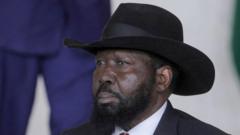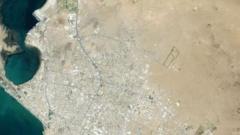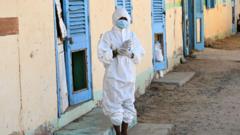South Sudan's acceptance of a deported man from the US marks a notable change in its approach to visa disputes with Washington. In response to the US's blanket visa revocation for South Sudanese citizens, the South Sudanese government now states it will allow entry for the individual involved, who they later identified as a national of the Democratic Republic of Congo.
South Sudan Reverses Deportation Stance Amid Visa Tensions with the US

South Sudan Reverses Deportation Stance Amid Visa Tensions with the US
In a significant shift, South Sudan agrees to accept the repatriation of a man deported from the US, aiming to ease diplomatic tensions.
South Sudan has recently announced its decision to permit the entry of a man deported from the United States, reflecting a significant shift in its diplomatic stance amidst rising tensions over visa policies between the two nations. This change comes on the heels of a stern ultimatum issued by US Secretary of State Marco Rubio, who stated that the US would revoke visas for all South Sudanese citizens in retaliation for South Sudan's previous refusal to accept the return of its deported nationals.
Initially, South Sudan's foreign ministry claimed that the deportee, whose identification as South Sudanese was purportedly mistaken, would not be welcomed back. Yet, in a remarkable turn of events, the government stated it would facilitate the man's return to Juba, emphasizing this decision as a gesture of goodwill aimed at maintaining friendly relations with the United States.
The diplomatic fallout began over an incident involving a Congolese individual mistakenly identified as South Sudanese. In light of this, the South Sudanese government asserted that it awaits the return of verified nationals being deported from the US and hopes for improved cooperation between the two countries. The decision to allow the individual to enter the country could happen as soon as Wednesday.
The US's strong response was unprecedented, with Rubio's declaration seemingly influenced by ongoing concerns regarding South Sudan's transitional government's capacity to manage its expatriates. He noted that future reviews of these visa restrictions would only occur once South Sudan demonstrated full cooperation. Notably, Deputy Secretary of State Christopher Landau dismissed South Sudan's claims regarding the deportation incident as "legally irrelevant", reinforcing US authority over determinations made by foreign embassies.
The backdrop to this diplomatic dispute is grave, as fears mount that South Sudan might spiral back into civil war. Tensions escalated following the house arrest of the First Vice-President, Riek Machar, leading to apprehensions about the stability of peace agreements established post a five-year civil conflict. Additionally, recent instructions for US non-emergency staff to vacate South Sudan reflect the deteriorating security conditions in the region.
While Temporary Protected Status (TPS) provided prior refuge for South Sudanese nationals in the US, such protections are nearing expiration, adding urgency to the negotiations. The current visa conflict thus underscores the intricate and often contentious relationship between the US and South Sudan as it grapples with domestic strife and international relations.





















